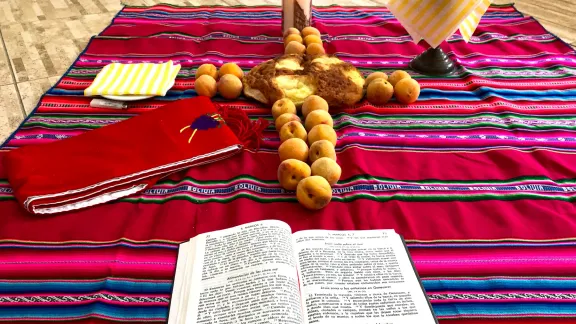
Lutherâs short treatise âOn the Freedom of a Christianâ calls believers to love God and serve our neighbors in need. Photo: LWF/M. Dölker
‘Being Lutheran’ webinar explores relevance of Luther’s text on liberty and service to neighbors in need
(LWI) - Luther’s 500-year-old treatise ‘On the Freedom of a Christian’ provides a compass for the churches today as they seek to navigate the complex challenges presented by the COVID-19 pandemic. Though the political and social context of the 16th century may bear little resemblance to our own, the document’s call to love God and serve our neighbor is more relevant than ever before.
In a 3 March ‘Being Lutheran’ webinar, Rev. Dr Carmelo Santos from the Evangelical Lutheran Church in America (ELCA) explored the message of this short text that Martin Luther wrote in 1520, as he developed his doctrine of justification by faith through grace. As Director of the ELCA’s office for Theological Diversity and Ecumenical and Interreligious engagement, Santos recently published a study guide to the document, including case studies on the meaning of Christian freedom for people in many different professions and walks of life.
“The aim of this study guide was not archaeological but theological,” Santos said, “not trying to go back to find the exact words of Luther, but using his text to discern what God is saying to us today.” In the context of Luther’s day, he continued, it is “important to remember that the state was held captive by the church” and therefore his words about liberation and freedom “really go to the core of the human dilemma.”
Rights and responsibilities
Though the power dynamics between church and state may be reversed in many countries today, Santos noted that Luther’s message speaks directly to the way Christians are “freed to love God and serve our neighbor” in the midst of current political and economic crises. “It is not about me and what I want to do, but about how I can be of service to others, especially the vulnerable,” he said. Pointing to the politicization of mask-wearing in public spaces as an example, he added: “it is not just about rights, but about my responsibility to protect my vulnerable neighbor.”
Luther believed that the state had “a responsibility to protect the proclamation of the Gospel, but not to choose who proclaimed it,” Santos explained. In today’s context, he continued, “freedom of religion must be balanced with the well-being of citizens” and if “people are dying because of some ideologies,” then the state must “step in and hold our religious leaders accountable for their words and actions.”
Santos went on to explore Luther’s description of the way we can be focused solely on our own personal needs and wants. “Everything we do is for ourselves,” he said, including charitable giving which “massages our ego,” yet we know that “good works are not enough if they are not driven by faith.” God’s grace frees us “to stand up straight, so that we can see our neighbors as they are and serve them” according to their needs.
Ethical implications
Confronted with fundamentalist discourse and manipulation of the Christian message, Santos said it is important that “we read the Gospels and allow Jesus to speak to us.” Power, privilege and “the hegemony of colonization” have created false standards against which we measure ourselves, he warned. Just as Luther translated the bible to enable people of his day to hear the Gospel message for themselves, he said, so we have been freed to “dwell in the Word” and “to hear God speaking directly to us” through our neighbor’s needs.
Reflecting on the ethical implications of Luther’s treatise for our time, moderator Rev. Dr Chad Rimmer pointed out how the concept of religious liberty is often abused today by those seeking to underwrite social or religious systems that exclude or oppress. Rimmer commented: “Luther’s treatise makes it clear that Christian liberty is the exact opposite. We need to decolonize these negative ideas about freedom, in order to emphasize love in action.”
I am not freed to be on my own, but freed for relationships, where the aim is always community.
Rimmer stressed the public implications of a personal faith. “I am not freed to be on my own, but freed for relationships, where the aim is always community - the foundation of Lutheran ethics,” he said.
The next ‘Being Lutheran’ webinar will take place on 5 May on the theme of Power. The Being Lutheran series is hosted by the Theology for Transformation Unit of the LWF Department for Theology, Mission and Justice.
LWF/P. Hitchen


